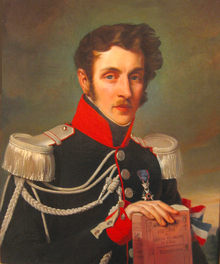You can help expand this article with text translated from the corresponding article in French. (December 2015) Click for important translation instructions.
|
| Leonard Chodźko | |
|---|---|
 | |
| Coat of arms | Kościesza |
| Born | (1800-11-06)6 November 1800 Oborek |
| Died | 12 March 1871(1871-03-12) (aged 70) Poitiers, France |
| Buried | Poitiers, France |
| Family | Chodźko |
| Father | Ludwik Chodźko |
| Mother | Waleria née Dederko |
Leonard Borejko Chodźko (1800–1871) was a Polish historian, geographer, cartographer, publisher, archivist, and activist of Poland's post-November-1830-Uprising Great Emigration.
Life
He was born on November 6, 1800, in Oborek, as the son of the nobleman Ludwik Chodźko [pl] and Waleria née Dederko. Chodźko was educated at the University of Vilnius, where he was a member of the Philomaths, a secret organization established in 1816 by Vilnius University students including Adam Mickiewicz, Tomasz Zan and Józef Jeżowski.
From 1826 he lived in Paris. During France's July 1830 Revolution, he served as aide-de-camp to General La Fayette.
Around 1810, he married Olimpia Maleszewska, the daughter of the Polish economist Piotr Maleszewski [pl], who in turn was the natural son of Michał Jerzy Poniatowski, the Primate of Poland and the brother of King Stanisław August Poniatowski. Olimpia's mother was Jeanne Venture de Paradis, known as "the Egyptian," the daughter of the French orientalist Jean Michel de Venture de Paradis. Leonard and Olimpia had no offspring.
Works
- Histoire des légions polonaises en Italie (1829)
- Histoire populaire de la Pologne (1863)
- Les Polonais en Italie (1829)
- Tableau de la Pologne ancienne et moderne sous le rapport géographique, statistique, géologique etc. (1830)
- Histoire politique de la Lituanie, depuis la réunion de la Pologne en 1386, jusqu’à son insurrection en 1831 (1831)
- Biographie du géneral Kościuszko (1837)
- Massacres de Galicie et Cracovie confisquée par l'Autriche en 1846 (1861)
- Un évêque polonais, le métropolitain Kazimir Gaspard Colonna Cieciszewski et son temps (1745-1831) (1866)
- Recueil des traités, conventions, actes diplomatiques etc. relatifs à la Pologne, de 1762 á 1862.
- Notice biographique sur Joachim Lelewel ; Paris, 1834
- Le Congrès de Vienne et les traités de 1815, précédés et suivis des actes diplomatiques qui s'y rattachent ; 1863 / 1864 ; éditeur : Amyot ; Paris ; 4 vol.
See also
Notes
- ^ "Leonard Chodźko h. Kościesza". wielcy.pl. Retrieved 2024-10-21.
- "Filomaci," Encyklopedia Polski, p. 164.
- ^ "Wielka Genealogia Minakowskiego - M.J. Minakowski". wielcy.pl. Retrieved 2024-10-21.
External links
Categories:- 1871 deaths
- 1800 births
- People from Maladzyechna district
- People from Oshmyansky Uyezd
- 19th-century Polish historians
- Polish male non-fiction writers
- Polish geographers
- Polish publishers (people)
- Polish cartographers
- Activists of the Great Emigration
- Vilnius University alumni
- Scholars from the Russian Empire
- Polish archivists